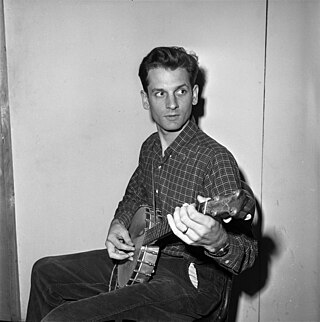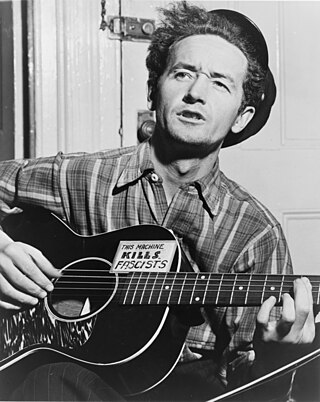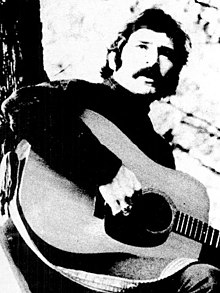
John Benson Sebastian (born March 17, 1944) is an American singer, songwriter and musician who founded the rock band the Lovin' Spoonful. He made an impromptu appearance at the Woodstock festival in 1969 and scored a U.S. No. 1 hit in 1976 with "Welcome Back."

The New Lost City Ramblers, or NLCR, was an American contemporary old-time string band that formed in New York City in 1958 during the folk revival. Mike Seeger, John Cohen and Tom Paley were its founding members. Tracy Schwarz replaced Paley, who left the group in 1962. Seeger died of cancer in 2009, Paley died in 2017, and Cohen died in 2019. NLCR participated in the old-time music revival, and directly influenced many later musicians.
Agnes "Sis" Cunningham was an American musician, best known for her involvement as a performer and publicist of folk music and protest songs. She was the founding editor of Broadside magazine, which she published with her husband Gordon Friesen and their daughters.

Mike Seeger was an American folk musician and folklorist. He was a distinctive singer and an accomplished musician who played autoharp, banjo, fiddle, dulcimer, guitar, mouth harp, mandolin, dobro, jaw harp, and pan pipes. Seeger, a half-brother of Pete Seeger, produced more than 30 documentary recordings, and performed in more than 40 other recordings. He desired to make known the caretakers of culture that inspired and taught him.
Broadside magazine was a small mimeographed publication founded in 1962 by Agnes "Sis" Cunningham and her husband, Gordon Friesen. Hugely influential in the folk-revival, it was often controversial. Issues of what is folk music, what is folk rock, and who is folk were roundly discussed and debated. At the same time, Broadside nurtured and promoted important singers of the era.

Bob Dylan's Greatest Hits Vol. II, also known as More Bob Dylan Greatest Hits, is the second compilation album by American singer-songwriter Bob Dylan, released on November 17, 1971 by Columbia Records. With Dylan not expected to release any new material for an extended period of time, CBS Records president Clive Davis proposed issuing a double LP compilation of older material. Dylan agreed, compiling it himself and suggesting that the package include a full side of unreleased tracks from his archives. After submitting a set of excerpts from The Basement Tapes that Davis found unsatisfactory, Dylan returned to the studio in September 1971 to recut several Basement songs, with Happy Traum providing backup.

Live at The Gaslight 1962 is a live album including ten songs from early Bob Dylan performances recorded in October 1962 at The Gaslight Cafe in New York City's Greenwich Village. Released in 2005 by Columbia Records, it was originally distributed through an exclusive 18-month deal with Starbucks, after which it was released to the general retail market. The album release coincided with the release of the documentary No Direction Home: Bob Dylan.

Eric Andersen is an American folk music singer-songwriter, who has written songs recorded by Johnny Cash, Bob Dylan, Judy Collins, Linda Ronstadt, the Grateful Dead and many others. Early in his career, in the 1960s, he was part of the Greenwich Village folk scene. After two decades and sixteen albums of solo performance he became a member of the group Danko/Fjeld/Andersen.

The American folk music revival began during the 1940s and peaked in popularity in the mid-1960s. Its roots went earlier, and performers like Josh White, Burl Ives, Woody Guthrie, Lead Belly, Big Bill Broonzy, Richard Dyer-Bennet, Oscar Brand, Jean Ritchie, John Jacob Niles, Susan Reed, Paul Robeson, Bessie Smith, Ma Rainey and Cisco Houston had enjoyed a limited general popularity in the 1930s and 1940s. The revival brought forward styles of American folk music that had in earlier times contributed to the development of country and western, blues, jazz, and rock and roll music.
"You Ain't Goin' Nowhere" is a song written by American musician Bob Dylan in 1967 in Woodstock, New York, during the self-imposed exile from public appearances that followed his July 29, 1966 motorcycle accident. A recording of Dylan performing the song in September 1971 was released on the Bob Dylan's Greatest Hits Vol. II album in November of that year, marking the first official release of the song by its author. Earlier 1967 recordings of the song, performed by Dylan and the Band, were issued on the 1975 album The Basement Tapes and the 2014 album The Bootleg Series Vol. 11: The Basement Tapes Complete.

Arthur Roy Traum was an American guitarist, songwriter, and producer. Traum's work appeared on more than 35 albums. He produced and recorded with The Band, Arlen Roth, Warren Bernhardt, Pat Alger, Tony Levin, John Sebastian, Richie Havens, Maria Muldaur, Eric Andersen, Paul Butterfield, Paul Siebel, Rory Block, James Taylor, Pete Seeger, David Grisman, Livingston Taylor, Michael Franks and Happy Traum, among others. Traum's songs were featured on PBS, BBC, ESPN, CBS, and The Weather Channel. He toured in Japan, Europe and the U.S.
Rowland Salley is an American musician, sometimes called Roly Salley. He is a bass guitarist and vocalist for Chris Isaak's band Silvertone. His best-known tune is "Killing the Blues", which has been covered by John Prine, Chris Smither, Shawn Colvin, Robert Plant and Alison Krauss, and most recently Shooter Jennings and Billy Ray Cyrus in 2015. As a band member for Chris Isaak, he was a regular on The Chris Isaak Show. Salley resides in California with his wife.
Bob Dylan bootleg recordings are unreleased performances by American singer-songwriter Bob Dylan, that have been circulated throughout the public without undergoing an official, sanctioned release. It is commonly misconceived that bootlegs are only restricted to audio, but bootleg video performances, such as Dylan's 1966 film Eat the Document, which remains officially unreleased, are considered to be bootlegs. Dylan is generally considered to be the most bootlegged artist in rock history, rivaled only by the Grateful Dead.
"John Brown" is a song by American singer-songwriter Bob Dylan. The song, written in October 1962 was released under his pseudonym "Blind Boy Grunt" on the Folkways Records compilation album Broadside Ballads, Vol. 1 (1963). Live performances have been officially released on MTV Unplugged (1995), Live at The Gaslight 1962 (2005), and Live 1962–1966 – Rare Performances From The Copyright Collections (2018). A demo version was issued on The Bootleg Series Vol. 9 – The Witmark Demos: 1962–1964 (2010).
"Farewell", also known as "Fare Thee Well", is a song by American singer-songwriter Bob Dylan. Dylan wrote the song in January 1963. He considered it for his third album, The Times They Are a-Changin', but only attempted a few takes during the album's first studio session. Dylan's earlier recordings of "Farewell" found their way onto various bootlegs, and a collection of demos that included the song was released in October 2010 on The Bootleg Series Vol. 9 – The Witmark Demos: 1962–1964.
Gil Turner was an American folk singer-songwriter, magazine editor, Shakespearean actor, political activist, and for a time, a lay Baptist preacher. Turner was a prominent figure in the Greenwich Village scene of the early 1960s, where he was master of ceremonies at New York City's leading folk music venue, Gerde's Folk City, as well as co-editor of the protest song magazine Broadside. He also wrote for Sing Out!, the quarterly folk music journal.

Tom Paxton is an American folk singer-songwriter who has had a music career spanning more than fifty years. In 2009, Paxton received a Grammy Lifetime Achievement Award. He is noteworthy as a music educator as well as an advocate for folk singers to combine traditional songs with new compositions.
Homespun offers music instruction for many instruments and styles on CD, DVD and streaming media.
Jeff Place is the Grammy Award-winning writer and producer and a curator and senior archivist with the Smithsonian Center for Folklife and Cultural Heritage. He has won three Grammy Awards and six Indie Awards.









